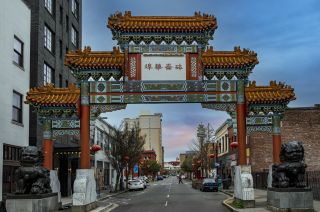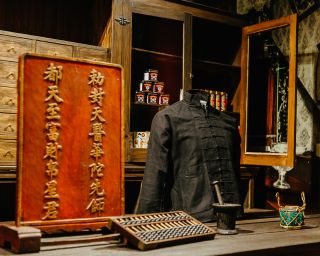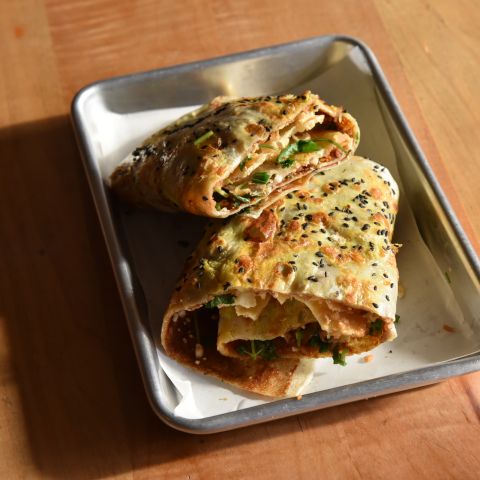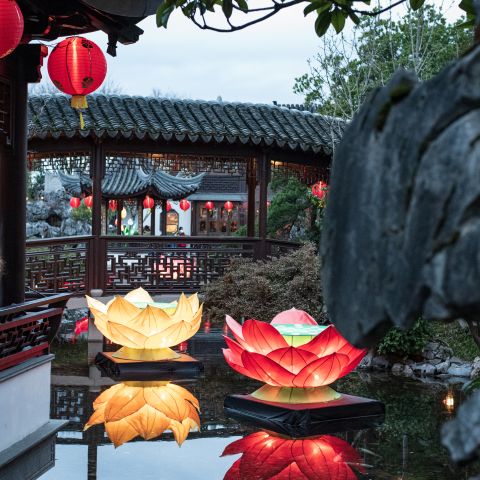Chinese American Community
Connect with the city's historic and vital Chinese American community.
This article was produced in collaboration with The Portland Chinese Times, a locally published, weekly Chinese-language newspaper that is an important resource for the community.
From 1880 to 1910 Portland’s Chinatown was second in size only to San Francisco’s. Today, the growing Chinese population is spread throughout the city, as are a variety of Chinese-owned businesses, Chinese schools and activities.
Chinese American History
In the 1850s, the California Gold Rush attracted emigrants from Southern China to the American West, including Oregon. They fled the hardships of their homeland in search of a better life in the United States, mainly working in gold mines, coastal fisheries and railroads. The men who emigrated from China were not allowed to bring their families, due to strict American immigration laws, and were subjected to extreme racism and discrimination. The Chinese Consolidated Benevolent Association (CCBA) was set up to protect these immigrants.
After the great flood in 1894, Portland was rebuilt, and many Chinese people moved from what had been Chinatown, at Southwest Second Avenue and Oak Street, north side of Burnside, where today’s Old Town Chinatown is located.
By the 1900s, Portland had the second-largest Chinatown on the West Coast, and 12 percent of the entire city’s population was Chinese. The buildings housed restaurants, Chinese opera theaters, grocers and herbal shops that catered to the Chinese population. Today, Portland’s Chinatown is a tourist destination rather than a Chinese enclave.
In the past decade, Chinese immigration to Portland has grown rapidly. The newer generations of immigrants come over as families, are more educated, and have economic power. Many live and work in the Jade District and areas between Southeast Powell Boulevard and Division Street around 82nd Avenue, which is considered the “New Chinatown.”
Another important piece of Chinese history in Portland is Block 14 of Lone Fir Cemetery, which was specifically set aside for Chinese immigrants. In the 1900s, this was the final resting place for many of the Chinese laborers who helped to build Portland. In keeping with Chinese custom, immigrants were buried in the cemetery for a time, until their bones could be dug up and returned to China to be reunited with relatives.
This tradition carried on for many years until the county decided to reclaim Block 14. In 1948, it was excavated with a bulldozer, the remains found were returned to China, and a building was erected on the site. In 2004, when Multnomah County planned to sell the property, Friends of Lone Fir Cemetery notified the Chinese community, and with the help of the Chinese Consolidated Benevolent Association and the Oregon Historical Society’s records, an archaeological investigation was undertaken. In 2005, a team of archaeologists found two completely intact burials, which halted the county’s plan to sell the building. Multnomah County now plans to build a memorial garden on that spot to honor the Chinese immigrants who helped build Portland.
Oldtown Chinatown
Portland’s historic Old Town Chinatown district is the symbolic heart of the earliest Chinese community in the greater Portland area. South of the Broadway Bridge and behind the Chinatown Gates, this neighborhood is rich in history.

Credit: Jon Kraft
The district’s streets are decorated with 57 ornamental street lights, painted red and gold to signify good luck and prosperity. The “Underground Portland” walking tour from Portland Walking Tours lets visitors explore the hidden history of the Old Town Chinatown neighborhood.
Old Town Chinatown can feel like a place where old meets new and east meets west. It’s in the small architectural details in the area, like the red and gold lampposts and the few buildings still topped with glazed roof tiles. Today, relatively few Chinese businesses remain in Old Town Chinatown, but the district is still home to most of the city’s Chinese associations or tongs, Lan Su Chinese Garden and the Chinatown Gateway, and it hosts regular cultural events.
Portland Chinatown Museum
Know Before You Go
The Portland Chinatown Museum is currently open Thursday–Sunday, 11 a.m.–3 p.m. Admission is $8 for adults and free for children 12 and under.
Mingled in with Portland mainstays like Ground Kontrol arcade bar and legendary drag revue Darcelle XV, members of this former Chinese enclave remain — even after many of the Chinese businesses, neighborhood organizations and residents slowly moved out. And thanks to the opening of the Portland Chinatown Museum in December 2018, the history of Old Town Chinatown won’t be lost.
Beyond the Gate: A Tale of Portland’s Historic Chinatowns
The museum’s permanent exhibit, Beyond the Gate: A Tale of Portland’s Historic Chinatowns, traces the impact of Chinese immigrants who sailed east to the western shores of the U.S. to build lives and communities in cities like Portland. A version of this exhibit was shown at the Oregon Historical Society in 2016, and its success was the impetus for Portland Chinatown History Foundation (a group of Chinatown elders who grew up in the neighborhood or who had family businesses there) to start thinking seriously about opening the museum. Jennifer Fang, Assistant Director at Portland Chinatown Museum, shared the sentiment many locals felt after viewing the OHS exhibit: “We [wanted] to be able to bring this show home to Chinatown.”

Credit: Ashley Anderson
Beyond the Gate is full of crisp black and white photos of 18th-century Chinese immigrants living in the very blocks of Portland that visitors now walk through every day — a reminder of how Chinese immigrants arrived in Portland with much to offer and were integral to the city’s founding. Creative replicas of a Chinese dry good store, medicine shop and an illicit gambling den full of artifacts are just a few of the exhibit’s highlights.
From there, the exhibit shows peaks and valleys of the lives of early Chinese immigrants. Many came to Portland in search of fortune after the West Coast gold rush and flourished as merchants, building homes in the city with Chinese language schools and a Chinese opera house. But, as Beyond the Gate documents, many Chinese Portlanders were eventually driven out of the city due to rising anti-Chinese sentiment and Chinese exclusion laws.
The exhibit ends with the work of Dean Wong, who has photographed Chinatowns across America and captured contemporary visions of Portland’s Chinatown. The museum is remarkable in that it’s documenting the very city blocks that surround it, bringing their history to life in a way that belies what we see now while strolling through the neighborhood.
Lan Su Chinese Garden
A serene retreat in the middle of Portland, this lush, city block-sized garden offers a moment of peace from the city hubbub. Designed by artisans from Suzhou and modeled after traditional Chinese gardens, Lan Su is full of native Chinese flora and foliage, as well as artful architectural touches like stone mosaics, wood carvings, a sculptural grotto and a waterfall. The garden’s rich landscape changes with the seasons and special events are frequent, so return visits are highly encouraged.

Chinese Consolidated Benevolent Association (CCBA)
A Chinese-language school has operated continuously in the Chinese Consolidated Benevolent Association (CCBA) building since 1908. The museum on the fourth floor contains historic artifacts depicting the Chinese people’s contribution to the development of the Pacific Northwest. The museum is open to the public by appointment only.
Chinese Restaurants in Chinatown
Located just a block away from Lan Su, Golden Horse is a great spot to dine after a visit to the garden. Golden Horse has been around long enough to see many of its Chinese neighbors move out and is one of the few remaining Chinese restaurants in Old Town. The lunch specials are a great deal and include popular Chinese American entrees like pork in Peking sauce, mapotofu and cashew chicken.
A mainstay in Chinatown, Good Taste, is a favorite among locals craving their favorite Cantonese comfort dishes. Located just beyond the Chinatown gates, the restaurant is known for its wonton soups, congee and roast pork — and for enticing drooling diners with roasted ducks in the window. Pro-tip: get an order of Chinese donuts, a.k.a. youtiao, to dip in a bowl of steamy congee
The Jade District: Portland’s “New Chinatown”
A vibrant hub of Asian culture focused around the intersection of Southeast 82nd Avenue and Division Street, the Jade District is marked by shops, restaurants and services that epitomize the unique character of this Southeast Portland neighborhood. Designated by the City of Portland in 2011 as a micro-urban renewal area, the community features assets as diverse as the Fubonn Shopping Center — the largest Asian shopping center in the state — Harrison Park School and the new, fast-growing Southeast campus of Portland Community College (PCC), as well as a mix of immigrant-owned businesses.
The Jade District International Night Market represents the latest efforts to celebrate the area’s rich heritage and thriving community. Often held at PCC’s Southeast Portland campus and the new APANO Multicultural Space, more than 20,000 visitors will enjoy multi-ethnic food and retail wares, a beer garden, a farmers market, live entertainment and activities for the whole family. Additionally, tours of the district are available by request through APANO (Asian Pacific American Network of Oregon).
Asian Eateries
Explore other offerings from Portland’s robust Asian and Southeast Asian restaurant scene.
Boba Tea in Portland
From tapioca pearls and popping boba to cheese foam and jelly, boba tea in Portland is a big hit. Here’s how to find your new favorite drink in the Rose City.
Asian Bakeries in Portland
Find your next favorite Asian bakery in Portland, with options like bulgogi croissants and mochi doughnuts; you’ll want to try them all.
Specialty Dishes of the Portland Jade District
Made like nowhere else in Portland, these often sold-out specialty dishes center heritage recipes and East and Southeast Asian cultural experiences.
Chinese American Art
Six galleries at the Portland Art Museum exhibit Chinese, Korean and Japanese art from the museum’s collection of nearly 4,000 Asian artworks. The Chinese collection spans the Neolithic to the modern periods, with strong representation in ceramics — primarily tomb objects — from the Han and Tang dynasties. Other holdings in Chinese art include furnishings and decorative arts.
Chinese American Events
Lunar New Year Celebrations
Chinese New Year is the most important festival of the year in Chinese Culture, and local organizations organize plenty of activities in Portland to celebrate.
The Lan Su Chinese Garden hosts two weeks of celebrations. 2025 is the Year of the Snake, and Lan Su will celebrate by hosting family-friendly activities during the daytime and Lantern Viewing Evenings with traditional music and performances. Other traditional celebrations are held throughout the year at Lan Su; check the Lan Su Event Calendar for details.
In partnership with the Oregon Historical Society, the Portland Chinatown Museum celebrates the holiday with lion dancers and performers and the yearly Lunar New Year Dragon Dance Parade. The parade winds its way through Old Town Chinatown, Downtown, and up to the Oregon Historical Society in the South Park Blocks.
The Chinese Friendship Association of Portland (CFAP), a non-profit, community-based organization dedicated to serving the Chinese community in Portland, organizes an annual celebration of the Oregon Lunar New Year Celebration. Held at the Keller Auditorium, the celebrations include performing acrobatics, traditional songs and dance performances, and martial arts demonstrations.
The annual Lunar New Year Celebration at the Washington Square Mall honors the tradition of the Wishing Tree. Shoppers are invited to make a wish on a red ribbon and toss it at the wishing tree in hopes that it will stick and their wish will come true in the coming year. The day-long celebration includes performances like traditional dances, Chinese Folktale storytelling, musical performances and puppet shows.
Rose Festival
The Rose Festival, Portland’s signature event, is held annually in May and June. In 2011, Chinese organizations in the greater Portland area formed a group to participate in the Rose Festival Parade. About 70 members from various local organizations work together to present the local Chinese community and its culture to the public.

The dragon boat race is a tradition of the Chinese Duan-Wu festival. Every year since 1988, nearly 100 local, national and international teams compete in the Dragon Boat Race at the Rose Festival using majestic boats provided through the Portland-Kaohsiung Sister City Association.
Chinese American Events
Explore Portland's Chinese American Culture at these upcoming events.
Annual Events
Find community and discover local artists and makers at these events.
Jade International Night Market
Thousands gather every August in Southeast Portland to celebrate the Jade District’s diverse immigrant community at the Jade International Night Market.
Lunar New Year Celebrations in Portland
Portland’s Asian communities celebrate the Lunar New Year with traditional dances, lantern ceremonies and stunning performances.
Portland Rose Festival
Portland Rose Festival features multiple parades, waterfront carnival rides, concerts, races, fireworks and plenty of roses.
Was this page helpful?





